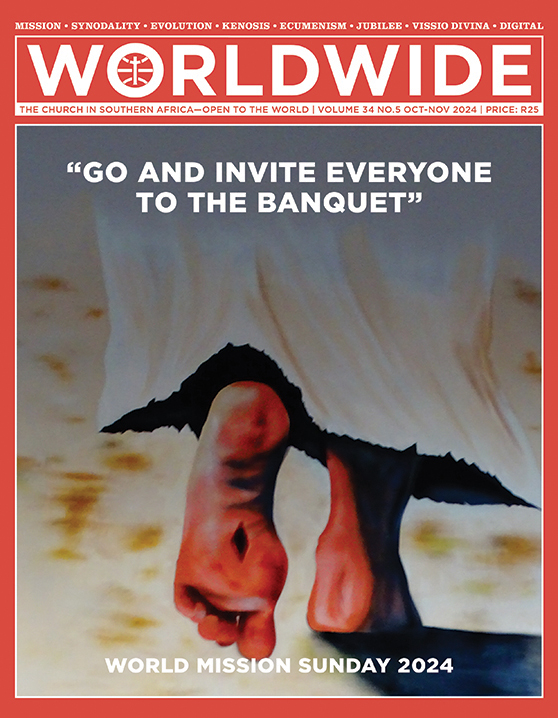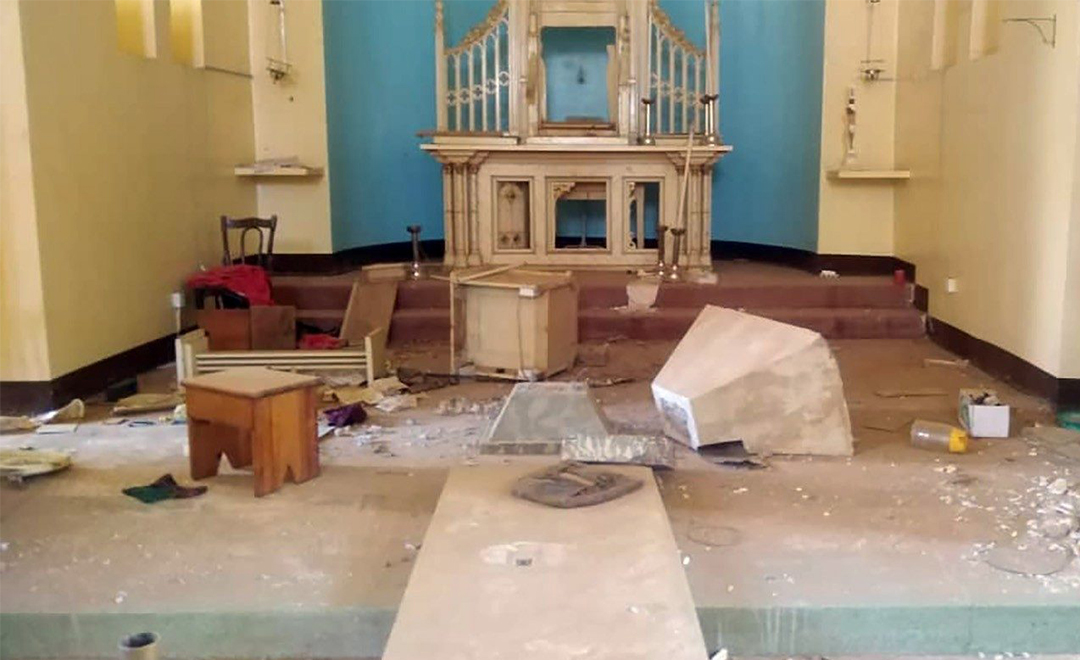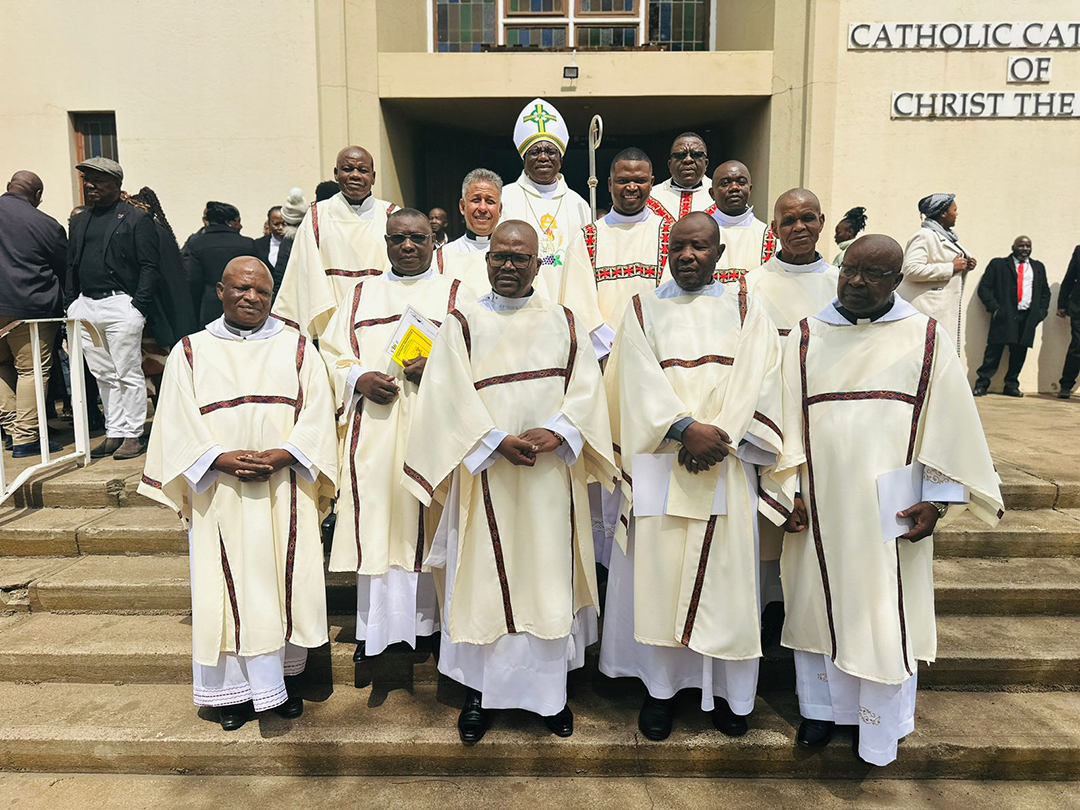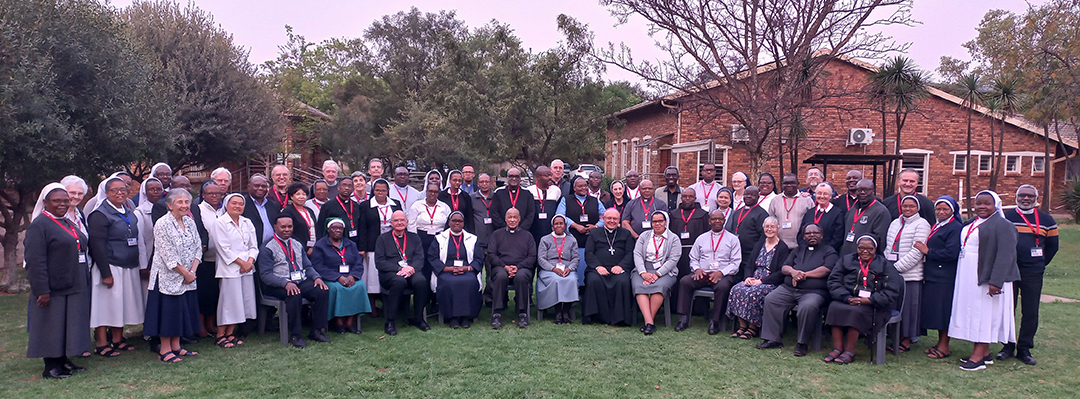
“GO AND INVITE EVERYONE TO THE BANQUET”
The image represents the feet of the Risen Jesus, in motion, showing the wounds of his Passion, yet ready to reach out and invite all to the banquet of his mercy. Likewise, Jesus invites to us to his mission in co-responsibility to bear witness to the power of his resurrection and to bring Jesus’ message of peace and fraternity to the whole world.
RADAR

“PEOPLE ARE DYING WHILE THE WORLD REMAINS INDIFFERENT”
In Sudan, the African country devastated by an endless war, tens of thousands of people have died and some ten million people have been displaced. What follows is the dramatic account of a religious: “Lay people, priests and nuns are also fleeing from here. Those who can, try to make it to South Sudan, Chad and Egypt.” The Church continues to help.
BY FEDERICO PIANA | VATICAN CITY
EVERYONE IS fleeing Sudan. Men are fleeing, horrified by a war between army and militias that brings only devastation and death. Women flee, maddened by the urgency to get their children to safety. Muslims flee, the religious majority fatigued by the sight of their homes and shops being attacked, their throats slit or their loved ones shot in cold blood. Also, Catholics, who before the outbreak of the conflict were a tiny minority of one million but are today barely half that number, are fleeing. They try to escape wherever they can. They want to forget the horrors, such as the one reported to the Vatican media by a religious who prefers to remain anonymous so as not to jeopardise his own safety and that of his brothers in the faith: “In the city of Sennar, a few days ago, a market was razed to the ground by bombs. There were about forty victims, poor people whose only crime was to look for some food to survive.”
The oblivion of information
This news has remained mired in the gutter of international information, which has also ignored dozens of other daily tragedies such as the one that occurred last mid-August in El Obeid, capital of the African country’s northern Kordofan state. The cleric becomes emotional when he tries to recall the incident, his voice almost cracking: “Dozens of children died under the rubble of a school demolished by missiles. An absurd and deliberate attack that no one took pity on.” Nobody cares about this war, which has been fought for more than a year now solely for the conquest of power, pitting army and militia against each other. And which is going through a dramatic stalemate: “Khartoum, the capital, devastated by continuous bombardments; the villages of Darfur, the province to the west of the nation, completely set on fire and plundered, once by the army and the next time by the militias; the cities of El Obeid, Sennar and Kaduqli rendered ghostly by machine-gun and cannon attacks. There is neither winning nor losing, only continued dying.”
Deep wounds
When he begins to describe the situation of the local Church in this hell of corpses and despair, our source gasps: “Foreign religious, diocesan priests, lay people: almost all have fled. There is hardly anyone left. In the archdiocese of Khartoum, for example, there are only three priests left who keep sacramental life alive as best they can. Only in the city of Port Sudan, in the north-east of the archdiocese, there is a large presence of Comboni religious, Mother Teresa sisters and another congregation of Indian nuns.” It is no better in the diocese of El Obeid where the bishop can only count on three priests. “Many of them, perhaps the majority, have fled to the Nuba Mountains, where the war has not yet arrived, and to South Sudan,” says the priest.
With the same proportions of priests and nuns, lay people have either fled the country, or are thinking of doing so. To those who remain, the local Church tries to guarantee the celebration of the sacraments even at the cost of having to reach them in the most remote and inaccessible areas. The cleric is proud to say that, despite everything, “the small Catholic communities that have found shelter in distant villages can count on the presence of catechists, to whom the liturgy of the Word is entrusted, and sometimes of those few remaining priests who go to them with difficulty and self-denial.”
Church’s charity
It has also become a priority for the local Church to assist and support the population. Food, water, medicine, blankets, cost more and more, and getting them to their destination is a complicated undertaking. Yet, the priest confirms that already for some time “donations and offerings are being collected with which we are helping the people directly. Whenever possible, we also manage to move people who need to go to hospital from one area to another. We help people on a case-by-case basis: not only Christians but anyone who is in need and knocks on our door.”
Asked if the Church could become an active part in the peace processes of the warring factions, the cleric does not hesitate to answer, starting from a fact: “We do not have the strength. We do not have direct diplomatic channels, such as the Nunciature, with which to interact politically and institutionally. What the Church can do is draw the media’s attention to what we are experiencing.”
This attention, however, seems to be absent, and oblivion has descended upon Sudan. “It is true. But the Church continues to speak. Even though we feel totally abandoned by the international community. Of course, there is the war in Ukraine and in the Holy Land, but here there are millions displaced people, thousands have died, and a million people are at risk of starvation. What more must happen to this wretched country for its desperate cry to be heard?”
Source: Vatican News



